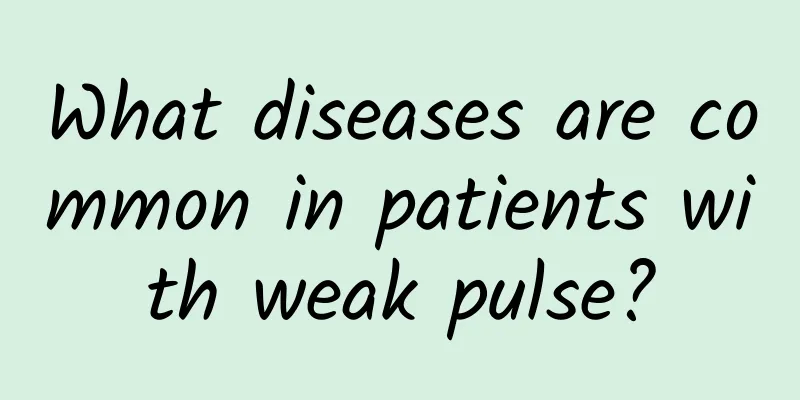What diseases are common in patients with weak pulse?

|
The occurrence of short pulse is often a way to reflect the physical condition of some people. For example, patients with rheumatic valvular heart disease, coronary heart disease, and hypertensive heart disease will all show symptoms of short pulse. 1. Rheumatic valvular heart disease Rheumatic valvular heart disease remains the most common cause of atrial fibrillation, especially mitral stenosis combined with regurgitation. Among them, the incidence of atrial fibrillation in patients with mitral stenosis was 41%, while the chance of atrial fibrillation in patients with aortic valve disease was lower. The average age of patients with atrial fibrillation is about 37 years old, and most of them are women. The mechanism of atrial fibrillation in rheumatic valvular heart disease is related to left atrial enlargement, increased atrial pressure and atrial myocardial lesions. Atrial enlargement, increased pressure and atrial myofibrosis lead to very uneven refractory periods in different parts of the atrial muscle, thereby inducing the occurrence of atrial fibrillation. 2. Coronary heart disease With the increase in the incidence of coronary heart disease, it has become the leading cause of atrial fibrillation in many countries and regions, with a higher proportion among the elderly. However, atrial fibrillation is not a common clinical manifestation of coronary heart disease. Among patients with obvious coronary artery stenosis shown in coronary angiography, the incidence of atrial fibrillation is 0.6% to 0.8%. Among patients with acute myocardial infarction, the incidence of atrial fibrillation is 10% to 15%. 3. Cardiomyopathy Various types of cardiomyopathy can cause atrial fibrillation, with an incidence rate between 10% and 50%. It is more common in adults but can also occur in children. Primary congestive cardiomyopathy is the main type, accounting for about 20%. 4. Hypertensive heart disease The proportion of hypertension in the causes of atrial fibrillation ranges from 9.3% to 22.6%. The occurrence of atrial fibrillation is related to electrophysiological abnormalities of hypertrophic myocardium caused by hypertension, myocardial ischemia and myocardial fibrosis. Atrial fibrillation is caused by myocardial hypertrophy and fibrosis, decreased ventricular compliance, increased atrial pressure and left atrial enlargement, as well as myocardial ischemia, which induce atrial electrophysiological disorders. 5. The incidence of constrictive pericarditis in general patients is 22% to 36%, the incidence of atrial fibrillation in elderly patients can reach 70%, and pericardial effusion may also be associated with atrial fibrillation. 6. Cor pulmonale: The incidence of atrial fibrillation in cor pulmonale has been reported to be 4% to 5%. It is often paroxysmal and its causes are related to repeated lung infections, long-term hypoxia, acidosis and electrolyte imbalance. 7. Congenital heart disease Among congenital heart diseases, atrial fibrillation is mainly seen in atrial septal defect. |
<<: Can I eat kelp if I have thyroid nodules?
>>: What causes stiff finger joints when waking up in the morning?
Recommend
What are the symptoms of heavy bleeding after medical abortion?
The most feared thing after medical abortion is h...
What is the most effective medicine for cough?
In daily life, we often encounter symptoms of thr...
Picture of Chinese medicine Ophiopogon japonicus
Ophiopogon japonicus is a common Chinese medicina...
What causes heel pain?
There are many common problems in life. Solving t...
What is the cause of fever and high blood count?
Fever is a common phenomenon in our lives. There ...
Can I take medicine with cold water?
Many people are accustomed to drinking some ice w...
Can Shenrong Sanshen Capsule treat impotence?
Every man wants to be able to stand firm in sex, ...
Pain in the left rib cage
Many people ignore their physical condition. Even...
How long does it take for epimedium to take effect?
It may take about half a month to a month for Epi...
Does Wuwei Xiaodu Yin treat acne?
Wuwei Xiaodu Yin is a common Chinese medicine pre...
Is hair loss caused by kidney deficiency? How to treat it?
Clinically, hair loss is a very common disease. G...
Pepper water for skin diseases
A skin disease characterized by unbearable itchin...
Can Artemisia Lower Blood Pressure?
I believe many people have heard of mugwort, and ...
What are the advantages of TCM treatment of hemorrhoids?
Early treatment, early relief Ms. Zhao is a newsp...
What are the symptoms of spinal tumors?
Everyone must pay attention to the disease of spi...









